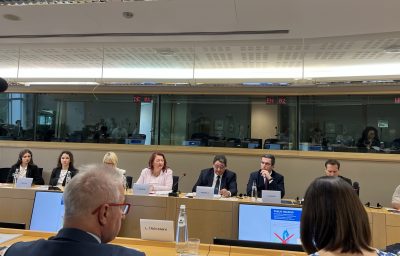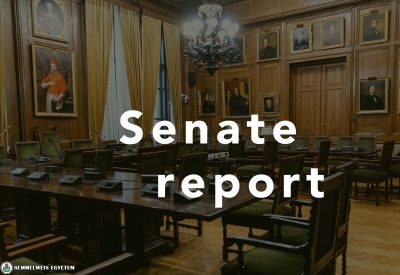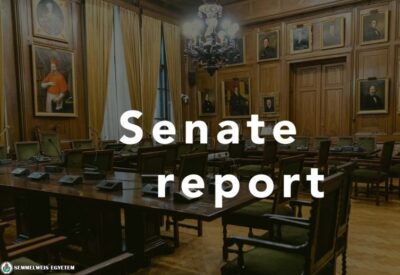The hearing, held on Wednesday, 7 June in the European Parliament in Brussels, was attended by Hungarian rectors, researchers, students and members of the EP. Following a European Union decision adopted on 15 December last year, Hungarian institutions who underwent the model change and their students will not be able to participate in the Erasmus and Horizon programs in 2024. Speaking at the event, Dr. Béla Merkely claimed that this has caused damage that has nothing to do with the protection of EU funds.
The decision causes irreversible, disproportionate damage, adversely affecting both the academic and student communities of universities
– said the Rector of Semmelweis University. He added that no objection had been raised from any EU institution regarding the operation of Semmelweis University, and the decision concerning the model-changing institutions did not include any justification that would make the sanctions imposed on the university comprehensible or explain them.
 With regard to the model change, he said, „Just as our predecessors have done over the centuries, we cooperate with state leaders and the government, but more importantly, we believe in the autonomy of universities. Over the past 254 years, governments and even political regimes have come and gone, but our quest for autonomy has remained unchanged. Two years ago, we had the opportunity to take a further step away from the state towards university autonomy.” In January 2021, the Senate of the university proposed a resolution to the Government of Hungary to change the maintenance model in order to follow international best practices, to achieve greater management autonomy, long-term predictability and financial sustainability. As a result, from 1 August 2021 Semmelweis University operates under the control of a public-interest trust foundation. The university is now maintained by the Foundation for National Health Care and Medical Education, whose professional board of trustees consists of four physicians and an economist.
With regard to the model change, he said, „Just as our predecessors have done over the centuries, we cooperate with state leaders and the government, but more importantly, we believe in the autonomy of universities. Over the past 254 years, governments and even political regimes have come and gone, but our quest for autonomy has remained unchanged. Two years ago, we had the opportunity to take a further step away from the state towards university autonomy.” In January 2021, the Senate of the university proposed a resolution to the Government of Hungary to change the maintenance model in order to follow international best practices, to achieve greater management autonomy, long-term predictability and financial sustainability. As a result, from 1 August 2021 Semmelweis University operates under the control of a public-interest trust foundation. The university is now maintained by the Foundation for National Health Care and Medical Education, whose professional board of trustees consists of four physicians and an economist.
„The Board of Trustees is chaired by the CEO of an internationally renowned pharmaceutical company and includes a world-renowned professor of vascular surgery at the US Mayo Clinic and myself, the Rector elected by the University Senate. The change of maintenance has not altered the rights and obligations involved. However, it resulted in a more competitive wage structure for employees, the transfer of our clinics and educational buildings to university ownership, and an increase in autonomy for education, research and medicine. The university has concluded a long-term, performance-based contract with the Hungarian government to finance its public functions,” he highlighted, pointing out that the Senate operates autonomously in compliance with all legal provisions, and since the change of model, 224 Senate resolutions have been adopted. Out of those, 33 have affected the Organizational and Operational Rules, of which only one has been subject to comments and proposed amendments by the Board of Trustees. Dr. Béla Merkely also noted that following the model change, the Rector was also elected by the Senate, which this year again chose between two candidates. Of the 45 members of the university’s main decision-making body, 44 are elected by the university’s citizens.
„The Implementing Decision of the Council of the European Union is baffling, inexplicable and devastating, which excludes Semmelweis University students from the European student exchange program, and with them all Hungarian medical and health science institutions,” said Dr. Béla Merkely. He added: „Since last December, Semmelweis University has suffered a loss of nearly 8 million euros due to the inability to contract for tenders already won or submitted, but perhaps even more significant is the damage to our reputation, which puts our students and researchers at a competitive disadvantage compared to students of other universities.”
He pointed out that Semmelweis University has appealed to the European Court of Justice to represent the interests of its teachers, researchers and students. The goal is to see this exclusionary decision withdrawn and to ensure that in the future, no sanctions are imposed on a higher education institution without a precise assessment of how and when it has violated the rule of law and the harm it has caused to the EU in this context.
Dr. Béla Merkely’s full statement can be read by clicking on this link (pdf).
A student initiative to participate in the international exchange program has been launched: the National Youth Council has started a petition to ensure that students from universities who underwent the model change can continue to participate in Erasmus+ higher education mobility programs. The Students’ Union (HÖK) of Semmelweis University has joined the initiative.
Erasmus is a unique opportunity for European students, including Hungarian students and those who study in Hungary, to gain autonomy, knowledge, and experience in another country and also to get to know other cultures
– said Nikole Argyros, a third-year student at the Faculty of Medicine of Semmelweis University, member of the International Students’ Committee of HÖK, a South African-Greek citizen. He added that he finds it terribly sad that they would like to take away this opportunity from international students studying in Hungary. He said that this would be a serious loss for all of them, penalizing those who are innocent in this case and deserve support, since they are the future of the country and of Europe: young people. “In my opinion, uninformed decisions are a violation of equal opportunities and could seriously harm tens of thousands to hundreds of thousands of young people who would like to educate themselves further,” he underlined.
Speaking at the event, Dr. Levente Kovács, Rector of Óbuda University, said that any issue related to education should be kept out of politics. “To deprive students of the opportunity to learn languages, to get to know the world, and to deprive our teachers and researchers of the opportunity to run well-functioning relationships is more than a mistake, it is a crime,” he added. Dr. Gyula Kasza, Associate Professor at the University of Veterinary Medicine, pointed out in his speech that the EU’s decision is a violation of the university’s reputation, and the institution will suffer incalculable financial and moral losses. “We call for the annulment of the decision, and a compensation for the material and moral damages,” he said.
MTI / Ádám Szabó
Translation: Viktória Kiss
Photo: Directorate General of Marketing and Communication


